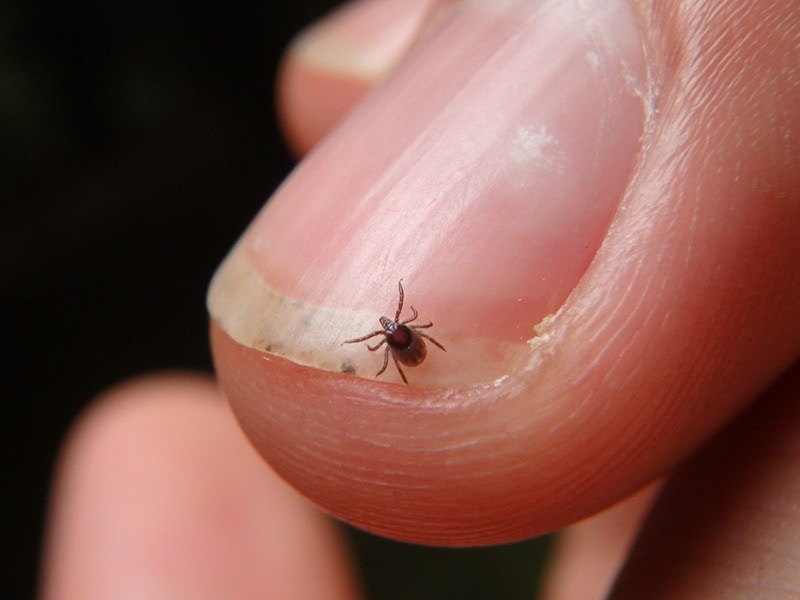Can Bird Mites Live on Dogs? Vet-Reviewed Facts & Tips

Updated on

Bird mites are avian parasites, meaning they primarily infest birds, but they can also make their way into your home and become a nuisance for you and your dog. While bird mites won’t live on your dog, they will feed off them, which can cause mild to severe discomfort.
Not only will you have to treat your dog, but you will also have to treat yourself, any other pets that live in the house, and your home, because these pests aren’t fussy about where they get their food. Below, we’ll discuss everything you’ll need to know if bird mites have become a problem for you.
Where Do Bird Mites Come From?
You’ll find that mites are most active in North America in the spring and early summer months, as they thrive in warm weather. If you went looking for them, you would find them in nests, meaning when a family of birds leaves or the young die, the mites will search for other hosts. The mites could eventually move to your dog if the nest is in your yard.
While bird mites survive on the blood of birds, they can live up to 3 weeks without it. However, recent studies suggest that bird mites might be more adaptable than we first thought, and they’ve developed a tolerance for non-avian hosts.1 This means you can’t just rely on these pests dying off themselves; you will need to seek treatment to eliminate them.
While bird mites don’t pose significant risks to your dog’s health, they are still uncomfortable, itchy, and painful.

How to Identify Bird Mites
It might be challenging to identify bird mites since they’re tiny—a mature mite is only around 1/32 inch long. Their color varies, although most are gray or brown, and young mites have six legs while the adults have eight. We recommend contacting your vet to ensure you have identified the right pest, as they can look very similar to canine lice, which will need a different treatment plan.
Not only will your dog be affected, but you will also, so if you notice small bites all over your body, it’s an indication you have bird mites. They generally bite at night, and you’ll notice new bites in the morning. However, you could mistake them for bedbugs, ticks, lice, or scabies. Your dog will also be itchy, and you might notice a rash on its skin and hair loss.
Other ways to identify if your home is infested with bird mites include the following:
- Bird nests nearby: If you have bites and a nest on your roof, it could point to bird mites.
- Tickling at night: Bird mites are most active at night; you might feel a tickling or crawling sensation at night.
- Environmental clues: If your home is humid, bird mites will be drawn to it.
- Another treatment isn’t working: If you are being treated for something else, such as scabies, and it isn’t working, it could be because of bird mites.
How to Get Rid of Bird Mites
Removing bird mites from your home is the solution to resolving the situation. Vacuum the floor, rugs, furniture, and floorboards regularly, and also wash out the canister or get rid of the vacuum bag to ensure the mites don’t crawl back out and reinfect your home.
Remove nests from your roof, and if you have birds, like chickens, in your yard, for example, treat them and their coop. If you have a nest in your yard, you have to wait for it to be abandoned before removing it. Removing a bird’s nest when it’s occupied is illegal since most species are protected under federal laws.
If you aren’t sure how the bird mites are entering your home, you should contact a pest control expert. Although pest control companies use pet-safe chemicals to treat homes, you’ll have to keep your pets and family away while your home is treated.

 Final Thoughts
Final Thoughts
While bird mites won’t live on your dog, they are still a nuisance for your pets and any other family members in your home. Bird mites rely on bird blood to survive, so if you don’t do anything and they don’t have access to a bird, they will die on their own. However, you can clean your home and have a professional treat it for bird mites so you and your pets don’t have to suffer from the mites’ bites.
See also:
- How Does Cat Flea Medicine Work? Vet Approved Explanation
- Leather Back Bearded Dragons: Facts, Pictures, Habitat & Care Guide
Featured Image Credit: David Jara Bogunya, Shutterstock











